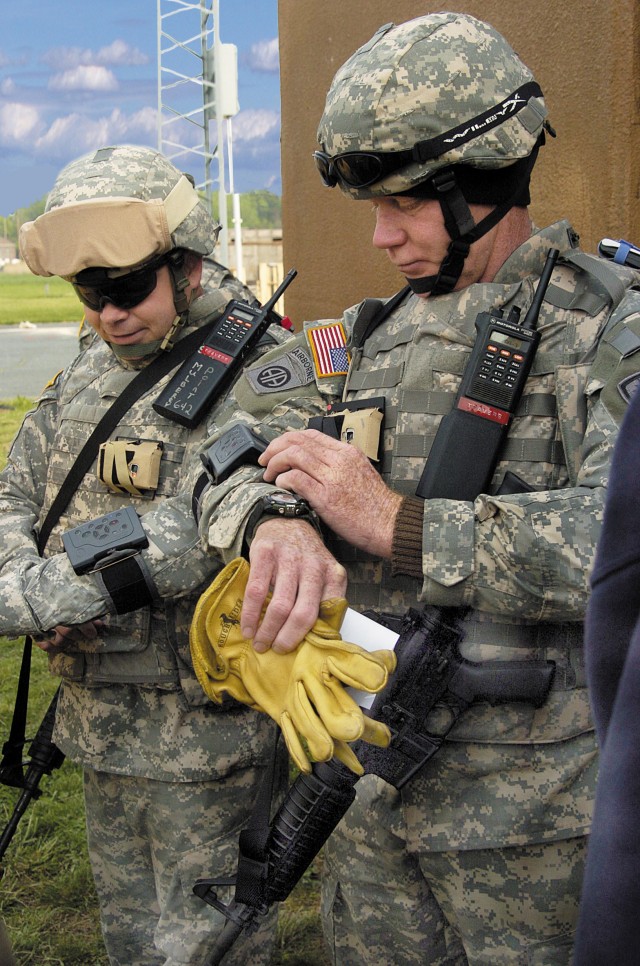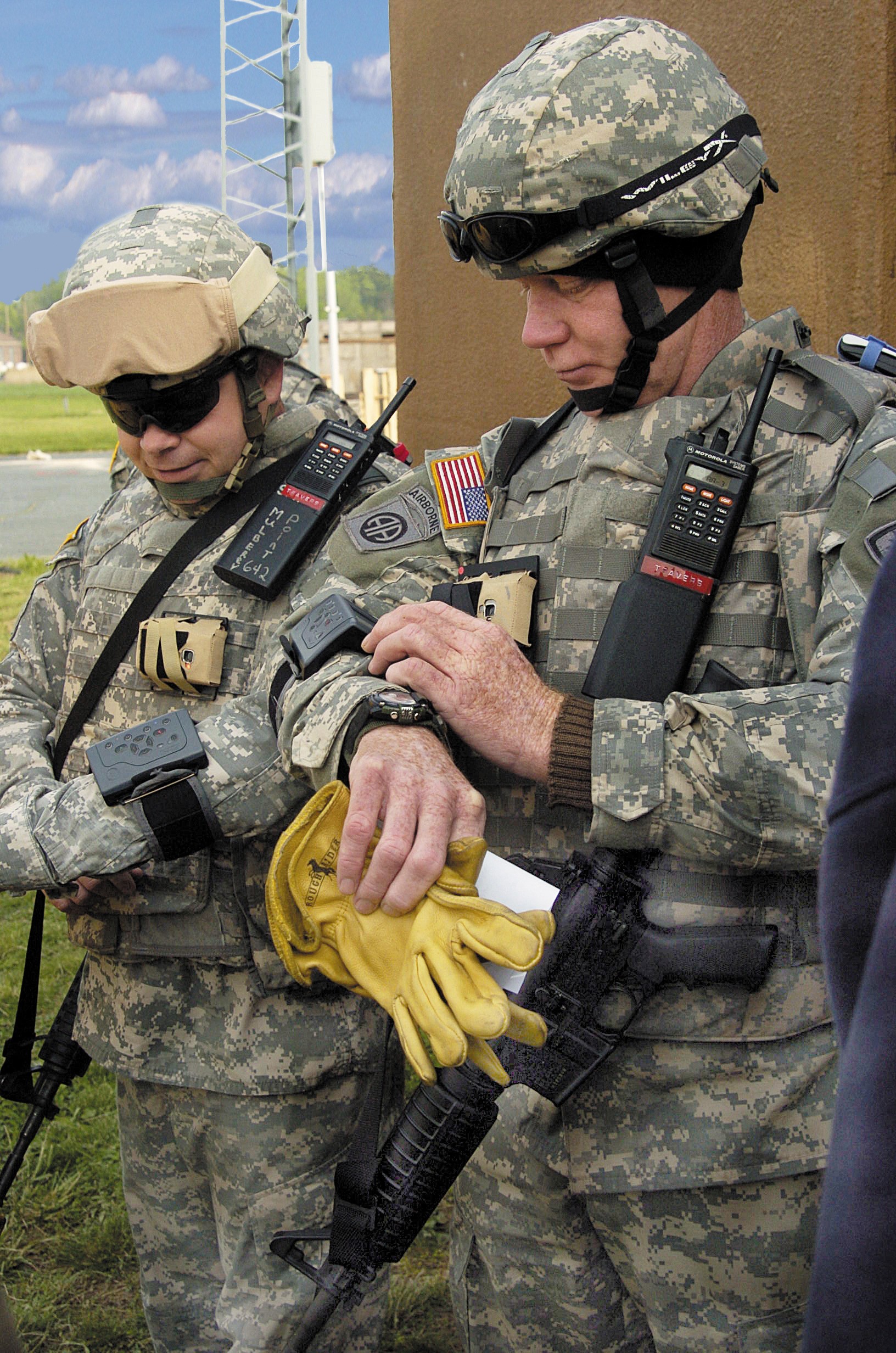In declaring 2009 the "Year of the Noncommissioned Officer," the U.S. Army is recognizing how the standards and values of its NCOs are essential to making it one of the world's most professional and formidable military forces. In peacetime and during conflicts such as the current war in Afghanistan and Iraq, the Army depends heavily on its NCOs to live up to and instill the warrior ethos that undergirds mission success and in many instances saves lives.
At Army test centers across the United States, the NCOs of the U.S. Army Developmental Test Command have a mission that differs from that of most Soldiers, but is every bit as crucial to the Army's success.
Known as "SOMTE" Soldiers in Army jargon - the acronym standing for "Soldier Operator, Maintainer, Tester and Evaluator" - these NCOs are helping the Army capture the Soldier perspective on a wide range of combat systems under testing. It is a mission that contributes to saving Soldiers' lives on the battlefield.
Several of the NCOs assigned to DTC's Aberdeen Test Center recently discussed their mission and what the "Year of the NCO" means to them personally.
Staff Sgt. Cleo McKinnon
"I'm honored to represent the Army as an NCO," said ATC's Staff Sgt. Cleo McKinnon, who became an NCO in January 2003. McKinnon said he wanted to become an NCO to follow in his father's footsteps and achieve the same goals his father had.
When asked what advice he would give to Soldiers wishing to become NCOs as well, he said, "Work to achieve the standards of an NCO, and when you set the standard, don't let up."
McKinnon gave credit to his Family for helping him achieve his goals.
"They have pushed me to work hard and make me believe I can accomplish anything if I work for it," he said.
Master Sgt. James Orr
Orr, who became an NCO in 1992, oversees the group of NCOs at ATC. He said NCOs responsible for other Soldiers play a critical role by setting the standards for subordinates and in looking out for them.
"An NCO supports Soldiers by taking care of them through training to standard, training to survive on the battlefield and mentoring them personally and professionally," Orr explained.
Like McKinnon and other NCOs at ATC, Orr feels honored to be a member of the Army's NCO Corps. He said setting aside a year to honor NCOs was a good way for the Army to recognize everything NCOs have accomplished in the past, are now accomplishing and will accomplish in the future.
"It is a way to recognize the NCO Corps for outstanding achievements and responsibilities inherent to us," he added.
Orr has had a variety of assignments during his Army career, including overseas assignments to places such as Kosovo at the beginning of this decade, to Kuwait in 2003 in support of war efforts and then to Iraq in 2005 to serve with the 3rd Infantry Division.
He said that the most memorable assignment of his career was during the deployment to Iraq, when he served as a platoon sergeant for the 2nd Battalion, 69th Armor Regiment in Ramadi. Most memorable of all was the heartfelt support that civilians at the airport gave to him and the other troops when they returned from Iraq, he said.
The most important character traits an NCO must possess are "duty, honesty and integrity," Orr said.
Sgt. 1st Class James Edington
Sgt. 1st Class James Edington, who became an NCO in April 1996, added "willingness to share their knowledge with others and flexibility" to the character traits an NCO should possess. Being prepared to mentor younger Soldiers is an important character trait to him.
"In numerous ways, the NCO is their advisor, mentor and teacher," he said. An NCO he remembers as "Master Sgt. Bell" mentored him when he was a younger Soldier assigned at Fort Ord, California, he said.
Edington also feels honored that his country and the Army are recognizing NCOs. He said his current assignment at ATC is the most important one he has had so far because, as a SOMTE Soldier, he gets to do things that support other Soldiers across the Army.
"I can see the impact of my assignment on the whole Army, not just at the unit level," he said.
Like others, he gives his Family a great deal of the credit for his success as a Soldier and NCO, saying he could always count on their "full support."
Sgt. 1st Class Niko Troia
ATC's Sgt. 1st Class Niko Troia, who became an NCO in 2001, said it is important for the Army to recognize the role that NCOs play because, "they silently serve without wanting to be recognized as the outstanding leaders that they are."
He thinks taking care of Soldiers is one of the NCO's most important responsibilities.
"As the NCO creed states, we are responsible for the welfare of the Soldier," he said. "Without the Soldier, the mission does not get accomplished.
"Sun Tzu states in 'The Art of War,' 'Regard your Soldiers as your children, and they will follow you into the deepest valleys; look on them as your own beloved sons, and they will stand by you even unto death,'" he quoted.
When asked what advice he would give to another Soldier considering becoming an NCO, he replied, "As an NCO, you will face those inevitable times when you must brace for rough weather, be ready for heavy workloads and unforeseen troubles. You will have to rely on yourself, and more importantly, your Soldiers to see you through."
He said the leadership and example set by his senior drill sergeant in basic training made a big impression on him.
"He never asked us or told us to do anything he was not willing to do," Troia said. "Every time we were told to do something, he did it with us. He led by, and set, the example to follow. He made an extreme impression on me that I have carried for thirteen years."
The most important character traits an NCO must possess are the "Army Values," a set of standards made clear to every Soldier in today's Army. NCOs must master these and the "NCO Creed," he said. He places special emphasis on the creed's first seven words - 'No one is more professional than I.'
Troia said he has had several mentors throughout various stages of his Army career, and one he remembered most clearly was an infantry major who had been an NCO himself before becoming an officer. This officer sent Troia to the Army's Primary Leadership Development Course with two pieces of advice: that a leader must first be willing to serve, and that Troia should not return from PLDC without being its honor graduate, a feat Troia accomplished by being first out of 132 graduates.


Social Sharing